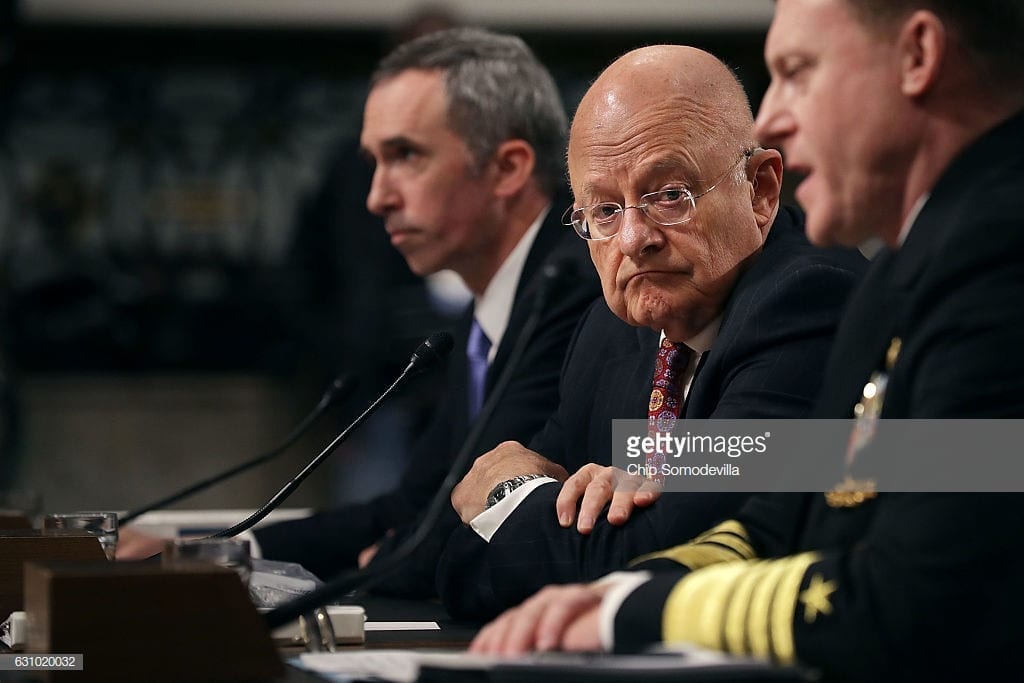
John Solomon from The Hill revealed that the bombshell intel report claiming that Russia wanted to elect Donald Trump wasn’t confirmed and the conclusion was politically motivated.
The text messages were exchanged at a critical time, less than 72 hours before the U.S. intelligence community would release an explosive report to then-President Obama, President-elect Donald Trump and the public concluding that Russia did in fact meddle in the 2016 election.
That report concluded Russia’s intent was to help Trump win the presidency.
But texts and emails uncovered by congressional investigators suggest there was some ambiguity in the classified information about sorting out the true intentions of Moscow.
Just before Christmas in 2016, as Trump was preparing to assume the presidency, Strzok and Page texted sentiments of concern that there was some conflicts between classified intelligence and the information already in the intelligence community.
Those conflicts, they feared, would surface as the FBI made its final contribution to the intelligence community report on Russia meddling.
“Man, our intel submission is going to be a BOMB,†Strzok texted on the evening of Dec. 18, 2016.
“Oh god, why do you say that?†Page wrote back. “Was planning to try to go in early to reach it before our mtg with Jim,†an apparent reference to FBI chief of staff James Rybicki.
“Oh it’s fine. You’ve heard it all. I’m just saying the C portion is absolutely different from the bulk of the stuff in the community. And the community and especially the WH will jump all over it since it’s what they WANT to say and they can attribute it to us, not themselves.
“All the benefit, none of the political risk. We get all of that,†Strzok added.
At the time, the FBI had the unverified dossier written by a former British spy alleging unproven collusion between the Trump campaign and Moscow, as well as information from an Australian diplomat suggesting a Trump campaign aide had prior knowledge of Russian hacking of Clinton’s emails.
Congressional investigators believe Strzok and Page might be referencing that classified information, since it was something not widely known in the intelligence community at the time.
But at the same time, the FBI also was debating whether it could definitely conclude that Russia’s intent in meddling in the 2016 election was to help Trump win. Strzok, in December, had talked with the House Intelligence Committee, and some lawmakers privately expressed concern that his analysis was different than that of the CIA, emails show.
On Dec. 10, 2016, the FBI received an inquiry from a reporter about whether the FBI was uncertain about the emerging conclusion that Russia was trying to help Trump win. The reporter intended to report that FBI counterintelligence was “much less emphatic than the CIA about Russia intent.â€
Strzok weighed in to help the FBI press office address the reporter’s question, an email that has now captured congressional investigators’ fancy because it states clearly the FBI couldn’t distinguish that any one of three possible motives drove Russia’s meddling.
“The specific point I made was we did not have information to differentiate what their ultimate goal was,†Strzok emailed, adding that then-Director James Comey told Senate Intelligence something similar.
“In other words, the activity is one-sided and clear but we can’t say the sole and primary purpose was specifically intended to help someone, hurt someone else or undermine the process. The reality is all three,†he wrote.
Strzok’s email is more carefully couched than the official intelligence report that came out Jan. 6, 2017, from the Obama administration that simply declared: “We also assess Putin and the Russian Government aspired to help President-elect Trump’s election chances when possible by discrediting Secretary Clinton and publicly contrasting her unfavorably to him.â€
That report has been the official conclusion of the community for two years. But there has been evidence of dissent or uncertainty — not on Russia’s meddling but as it relates to Trump.
The National Security Agency disclosed it only had “moderate confidence†in the conclusion that Putin was trying to help Trump. The House Intelligence Committee said it could not validate Putin’s intentions about Trump.
And now Strzok’s recently disclosed emails and texts show the final process leading to the issuance of the Russia report was secretly mired in concerns about “partisan axes,†differences in intelligence community information and a subtle but important realization that the “primary purpose†for Russia’s meddling really couldn’t be determined.
This confirms what many Conservatives have theorized regarding Russia’s interference in the 2016 Presidential election. Russia wasn’t interfering to help Donald Trump they were interfering to divide our country. Of course, luckily for Russia, they had an ally in the Mainstream Media and the Democratic party. They ran with phony talking points regarding Russia and made half the country believe that our elected President of The United States was a traitor and the election was stolen.
GETTY IMAGES:
[getty src=”631020032″ width=”594″ height=”396″ tld=”com”]




